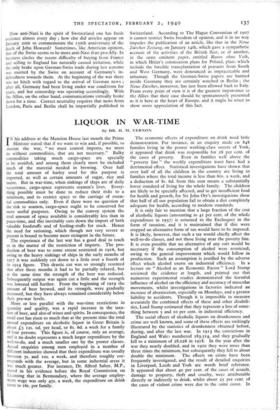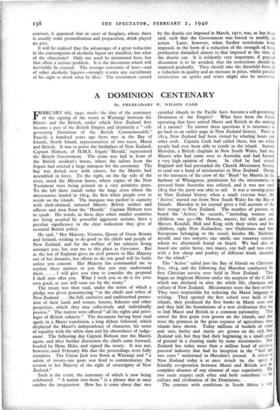LIQUOR IN WAR-TIME By DR. H. M. VERNON T N
his address at the Mansion House last month the Prime Minister stated that if we want to win and, if possible, to shorten the war, "we must control imports, we must do without commodities, that are not necessary." Bulky commodities taking much cargo-space are specially to be avoided, and among them clearly must be included much of the material needed in brewing. Over half the total amount of barley used for this purpose is imported, as well as certain amounts of sugar, rice and maize. But in war-time, when sinkings of ships are of daily occurrence, cargo-space represents seamen's lives. Every- thing possible must be done to reduce their risks to a minimum, and to restrict space to the carriage of essen- tial commodities only. Even if there were no question of the risk to seamen, cargo-space ought to be conserved for more useful purposes. Owing to the convoy system the total amount of space available is considerably less than in peace-time, and this inevitably cuts down the import of both valuable foodstuffs and of feeding-stuffs for stock. Hence the need for rationing, which though not very severe at present is bound to become more stringent in the future.
The experience of the last war has a good deal to teach us in the matter of the restriction of imports. The pro- duction of beer was to some extent restricted in 1916, but owing to the heavy sinkings of ships in the early months of 1917 it was suddenly cut down to a little over a fourth of its 1914 figure. This drastic cut was so strongly resented that after three months it had to be partially relaxed, but at the same time the strength of the beer was reduced. Subsequently output was again cut a little and the strength was lowered still further. From the beginning of 1919 the amount of beer brewed, and its strength, were gradually increased, but they have always remained considerably below their pre-war levels.
More or less parallel with the war-time restrictions in quantity and quality, was a rapid increase in the taxa- tion of beer, and also of wines and spirits. In consequence, the retail cost has risen so much that at the present time the total annual expenditure on alcoholic liquor in Great Britain is about k5 is. od. per head, or 8s. 6d. a week for a family of four persons. This figure is, of course, only an average, and it no doubt represents a much larger expenditure by the well-to-do, and a much smaller one by the poorer classes. Actual enquiries among men employed in a number of different industries showed that their expenditure was usually between 5s. and los. a week, and therefore roughly cor- responds with the average, but in some industrial areas it was much greater. For instance, Dr. Alfred Salter, M.P., stated in his evidence before the Royal Commission on Licensing that in Bermondsey, where the average employ- ment wage was only 45s. a week, the expenditure on drink came to 16s. per family. The economic effects of expenditure on drink need little demonstration. For instance, in an enquiry made on 848 families living in the poorer working-class streets of York, it appeared that drink was responsible for 28 per cent. of the cases of poverty. Even in families well above the "poverty line" the weekly expenditure must have had a detrimental effect. Statistical investigations have shown that over half of all the children in the country are living in families where the total income is less than 6os. a week, and a deduction of 8s. 6d. from this sum means a substantially lower standard of living for the whole family. The children are likely to be specially affected, and to get insufficient food for health and growth, for Sir John oreS investigations show that half of all our population fail to obtain a diet completely adequate for health, according to modern standards.
It is only fair to mention that a large fraction of the cost of alcoholic liquors (amounting to 41 per cent. of the whole expenditure in 1937) is returned to the Exchequer in the form of taxation, and it is maintained that if this were stopped an alternative form of tax would have to be imposed. It is likely, however, that such a tax would chiefly affect the well-to-do classes, and not those living near the poverty line. It is even possible that no alternative of any sort would be necessary if the consumption of alcohol were restricted, owing to the general improvement which would follow in production. Such an assumption is justified by the adverse effect which alcohol exerts on industrial efficiency. In a lecture on "Alcohol as an Economic Factor" Lord Stamp reviewed the evidence at length, and pointed out that numerous experimental studies demonstrated the harmful influence of alcohol on the efficiency and accuracy of muscular movements, whilst investigations in factories indicated an increase of absenteeism, especially on Mondays, and a greater liability to accidents. Though it is impossible to measure accurately the combined effects of these and other disabili- ties, Lord Stamp estimated that they represent a loss of some- thing between 5 and 10 per cent. in industrial efficiency.
The social effects of alcoholic liquors on drunkenness and crime are well known, and some of these effects are strikingly illustrated by the statistics of drunkenness obtained before, during, and after the last war. In 1913 the convictions in England and Wale3 numbered 183,514, and they gradually fell to a minimum of 28,028 in 1918. In the year after the war they nearly doubled, and in 1920 they were more than three times the minimum, but subsequently they fell to about double the minimum The effects on crime have been frequently investigated, and the result of detailed enquiries in Liverpool, Leeds and York are worth brief reference. It appeared that about 40 per cent. of the cases of assault, damage to property, theft and cruelty, were attributable directly or indirectly to drink, whilst about 25 per cent. of the cases of violent crime were due to the same cause. In contrast, it appeared that in cases of burglary, where there is usually some premeditation and preparation, drink played no part.
It will be realised that the advantages of a great reduction in the consumption of alcoholic liquor are manifest, but what of the objections? Only one need be mentioned here, but that offers a serious problem. It is the discontent which will inevitably be created. The average consumer of beer—and of other alcoholic liquors—strongly resents any curtailment of his right to drink what he likes. The resentment caused by the drastic cut imposed in March, 1917, was, as has been said, such that the Government was forced to modify its action. Later, however, when further restrictions were imposed, in the form of a reduction of the strength of beer, production dwindled almost to that imposed at the time of the drastic cut. It is evidently very important, if general discontent is to be avoided, that the restrictions should be imposed gradually. They should take the threefold form of a reduction in quality and an increase in price, whilst parallel restrictions on spirits and wines might also be necessary.







































 Previous page
Previous page